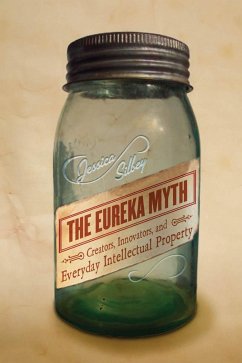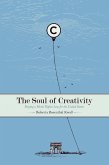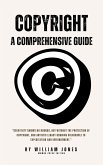24,95 €
24,95 €
inkl. MwSt.
Sofort per Download lieferbar

12 °P sammeln
24,95 €
Als Download kaufen

24,95 €
inkl. MwSt.
Sofort per Download lieferbar

12 °P sammeln
Jetzt verschenken
Alle Infos zum eBook verschenken
24,95 €
inkl. MwSt.
Sofort per Download lieferbar
Alle Infos zum eBook verschenken

12 °P sammeln
- Format: ePub
- Merkliste
- Auf die Merkliste
- Bewerten Bewerten
- Teilen
- Produkt teilen
- Produkterinnerung
- Produkterinnerung

Bitte loggen Sie sich zunächst in Ihr Kundenkonto ein oder registrieren Sie sich bei
bücher.de, um das eBook-Abo tolino select nutzen zu können.
Hier können Sie sich einloggen
Hier können Sie sich einloggen
Sie sind bereits eingeloggt. Klicken Sie auf 2. tolino select Abo, um fortzufahren.

Bitte loggen Sie sich zunächst in Ihr Kundenkonto ein oder registrieren Sie sich bei bücher.de, um das eBook-Abo tolino select nutzen zu können.
Are innovation and creativity helped or hindered by our intellectual property laws? In the two hundred plus years since the Constitution enshrined protections for those who create and innovate, we're still debating the merits of IP laws and whether or not they actually work as intended. Artists, scientists, businesses, and the lawyers who serve them, as well as the Americans who benefit from their creations all still wonder: what facilitates innovation and creativity in our digital age? And what role, if any, do our intellectual property laws play in the growth of innovation and creativity in…mehr
- Geräte: eReader
- mit Kopierschutz
- eBook Hilfe
- Größe: 1.43MB
Andere Kunden interessierten sich auch für
![The Pocket Legal Companion to Patents (eBook, ePUB) The Pocket Legal Companion to Patents (eBook, ePUB)]() Carl W. BattleThe Pocket Legal Companion to Patents (eBook, ePUB)11,86 €
Carl W. BattleThe Pocket Legal Companion to Patents (eBook, ePUB)11,86 €![The Soul of Creativity (eBook, ePUB) The Soul of Creativity (eBook, ePUB)]() Roberta Rosenthal KwallThe Soul of Creativity (eBook, ePUB)22,95 €
Roberta Rosenthal KwallThe Soul of Creativity (eBook, ePUB)22,95 €![Copyright: A Comprehensive Guide (eBook, ePUB) Copyright: A Comprehensive Guide (eBook, ePUB)]() William JonesCopyright: A Comprehensive Guide (eBook, ePUB)2,99 €
William JonesCopyright: A Comprehensive Guide (eBook, ePUB)2,99 €![Creativity without Law (eBook, ePUB) Creativity without Law (eBook, ePUB)]() Creativity without Law (eBook, ePUB)24,95 €
Creativity without Law (eBook, ePUB)24,95 €![Intellectual Property Crash Course (eBook, ePUB) Intellectual Property Crash Course (eBook, ePUB)]() IntroBooks TeamIntellectual Property Crash Course (eBook, ePUB)2,99 €
IntroBooks TeamIntellectual Property Crash Course (eBook, ePUB)2,99 €![Patents Demystified (eBook, ePUB) Patents Demystified (eBook, ePUB)]() Dylan O. AdamsPatents Demystified (eBook, ePUB)20,95 €
Dylan O. AdamsPatents Demystified (eBook, ePUB)20,95 €![Pre-ANDA Litigation (eBook, ePUB) Pre-ANDA Litigation (eBook, ePUB)]() Pre-ANDA Litigation (eBook, ePUB)203,95 €
Pre-ANDA Litigation (eBook, ePUB)203,95 €-
-
-
Are innovation and creativity helped or hindered by our intellectual property laws? In the two hundred plus years since the Constitution enshrined protections for those who create and innovate, we're still debating the merits of IP laws and whether or not they actually work as intended. Artists, scientists, businesses, and the lawyers who serve them, as well as the Americans who benefit from their creations all still wonder: what facilitates innovation and creativity in our digital age? And what role, if any, do our intellectual property laws play in the growth of innovation and creativity in the United States?
Incentivizing the "progress of science and the useful arts" has been the goal of intellectual property law since our constitutional beginnings. The Eureka Myth cuts through the current debates and goes straight to the source: the artists and innovators themselves. Silbey makes sense of the intersections between intellectual property law and creative and innovative activity by centering on the stories told by artists, scientists, their employers, lawyers and managers, describing how and why they create and innovate and whether or how IP law plays a role in their activities. Their employers, business partners, managers, and lawyers also describe their role in facilitating the creative and innovative work. Silbey's connections and distinctions made between the stories and statutes serve to inform present and future innovative and creative communities.
Breaking new ground in its examination of the U.S. economy and cultural identity, The Eureka Myth draws out new and surprising conclusions about the sometimes misinterpreted relationships between creativity and intellectual property protections.
Incentivizing the "progress of science and the useful arts" has been the goal of intellectual property law since our constitutional beginnings. The Eureka Myth cuts through the current debates and goes straight to the source: the artists and innovators themselves. Silbey makes sense of the intersections between intellectual property law and creative and innovative activity by centering on the stories told by artists, scientists, their employers, lawyers and managers, describing how and why they create and innovate and whether or how IP law plays a role in their activities. Their employers, business partners, managers, and lawyers also describe their role in facilitating the creative and innovative work. Silbey's connections and distinctions made between the stories and statutes serve to inform present and future innovative and creative communities.
Breaking new ground in its examination of the U.S. economy and cultural identity, The Eureka Myth draws out new and surprising conclusions about the sometimes misinterpreted relationships between creativity and intellectual property protections.
Dieser Download kann aus rechtlichen Gründen nur mit Rechnungsadresse in A, D ausgeliefert werden.
Produktdetails
- Produktdetails
- Verlag: Stanford University Press
- Seitenzahl: 368
- Erscheinungstermin: 17. Dezember 2014
- Englisch
- ISBN-13: 9780804793537
- Artikelnr.: 48417274
- Verlag: Stanford University Press
- Seitenzahl: 368
- Erscheinungstermin: 17. Dezember 2014
- Englisch
- ISBN-13: 9780804793537
- Artikelnr.: 48417274
Jessica Silbey is Professor of Law at Suffolk University Law School. Professor Silbey's work engages a cultural analysis of law. Professor Silbey has written for various journals and news outlets, and is coeditor of Law and Justice on the Small Screen (2012).
Contents and Abstracts Introduction: Introduction chapter abstract The introduction introduces the book as a qualitative empirical interview study with artists, scientists, engineers and business people in creative and innovative industries. It situates the book as an investigation into the motives and mechanisms of creative and innovative work and in the context of the theoretical and quantitative literature on IP and its success at achieving the "progress of science and the useful arts," a Constitutional goal. Based on analysis of the accounts from the interviews, the introduction describes how there exists a diversity of reasons for and mechanisms by which creative and innovative work gets made and distributed, only a small part of which is intellectual property law. This challenges core principles of IP law, especially an assumption that exclusivity through property rights is essential to stimulating art, science and technological progress. 1Inspired Beginnings chapter abstract Chapter 1 traces the features of a specific story form, "the origin story" throughout the interviews. An "origin story" begins with an inspired moment that sets the person or organization on its path. Origin stories serves particular purposes. They explain how a culture or society began (e.g., Genesis). They infuse an aspect of everyday life with special significance by explaining why things are as they are (e.g., "you were born that way"). They guide how things should evolve in the future (e.g., "the agreement memorializes our future intentions"). Each interviewee explains a milestone in their professional life in terms of an origin story, referring to a past that has unique significance for making sense of the present. Chapter 1 canvasses these origin stories to explain how most describe the embarkation of their work in art or science mostly due to intrinsic or serendipitous forces, unrelated to IP. 2Daily Craft: Work Makes Work chapter abstract Chapter 2 explores the varied ways the interviewees describe their daily work. Similarities in accounts coalesce around the dimensions of time, space and labor. Most articulate a common respect for constant and committed daily work, focusing on the importance of physical spaces (studio, lab, desk) and time spent. Distinct metaphors and word patterns illuminate the expressive focus on time, space and labor, highlighting a misfit between IP protection and the interviewees' aspirations or expectations for reward. Interviewees describe work with natural metaphors (e.g., harvesting or fishing), implying that the physical labor dignifies the output. This contrasts with IP, which does not reward labor or time. Interviewees translate their intellectual work into tangible output, comparing their work to real or personal property. Ironically, describing the value of their work in material terms strengthens the possessive impulse manifesting as property claims that are more robust than IP law provides. 3Making Do With A Mismatch chapter abstract Chapter 3 describes the transitions from beginnings and everyday work to the business of developing a career in IP-rich fields. Interviewees provide diverse accounts of "making do" in creative and innovative industries. Although some interviewees describe direct reliance on specific forms of IP, many business models rely only indirectly on IP rights. Indeed, most interviewees embrace a system of IP that is "leaky" or misaligned insofar as IP is not the optimal avenue for achieving professional goals. Interviewees rarely describe the need to exercise the full range of exclusivity to which IP law entitles them. Although IP rights are both under-enforced and over-enforced at times, the most common strategy interviewees describe is to relax IP rights in order to achieve three common goals: a sustainable business, productive and satisfying relationships, and a measure of autonomy in life and work. 4Reputation chapter abstract Chapter 4 describes how interviewees value reputation and attribution. When asked to describe some of the most contentious infractions during their career, interviewees describe reputational free riding, not economic free riding. And where the two intersect (which is often, especially in the trademark context), language of dignity and desert rather than economic harm dominates. Moreover, interviewees assert a desire for reputational control from IP law where it rarely exists. This Chapter analyzes the common accounts and metaphors that predominate in stories of reputational injury
stories of family, bodily integrity and life or death. Understandably, emotions run high in this context and the language seeking to justify the entitlement to reputational control often resemble stronger rights and obligations than IP (or neighboring regimes) provide. Over-protection in these situations can lead to misuse of IP laws or an increasing frustration from artists and scientists that IP law is irrelevant to them. 5Instruction: How Lawyers Harvest IP chapter abstract Chapter Five describes how IP intervenes as an external force shaping and directing art and science. IP law affecting the work's on-going vitality is largely absent until a lawyer or business partner intervenes. IP arrives later for creative and innovative work trajectory and comes with a coach. Interviewees describe lawyers as disruptive and distracting, whereas the lawyer describes herself as bringing tools to facilitate work or business. When the lawyer is welcome, it is when she has translated IP into client interests resonating with everyday work or goals. The lawyer's varied characterizations of IP in terms the client accepts correlates to jurisprudential categories of legality (e.g., natural law, distributive justice). This invites the conclusion that IP's form and purpose, shaped by legal advice and client concerns, is not predetermined by legal rules or economic principles, but is constitutive of creativity and innovation and influenced by preexisting interests and motivations. 6Distribution: How IP Circulates chapter abstract Dissemination is the ultimate goal of IP and a dominant reason interviewees pursue their work. Interviewees describe managing formal and informal agreements outlining the nature and scope of distribution. These agreements vary, from free and promiscuous sharing to circumscribed and discriminating price schemes. The propertization of the work (protecting it through exclusivity) is sometimes a precondition to fulfilling distribution goals, which include: earning a living, building relationships, sustaining professional autonomy and challenging core competencies. But interviewees describe how relaxed distribution networks satisfy most personal and professional goals. Indeed, strictly controlling dissemination
what IP law provides
is only one distributional method and not the most common. This chapter analyzes the interviews for accounts of the many forms dissemination takes and the reasons for engaging in it, unpacking the relationships between exclusive rights to distribution on the one hand and dissemination as a form of professional and personal success on the other. Conclusion: Conclusion chapter abstract The book closes with a summary of how U.S. intellectual property regimes are misaligned with the needs of and hopes for those engaging in creative and inventive work. It further suggests reasons for and ways that the IP system should remain misaligned: to promote choice and flexibility for creators and innovators (whether or not they own or claim IP rights). But the conclusion also suggests places in our IP system where some relaxation of our IP system might usefully occur in order to facilitate core concerns of IP-rich fields and their audience as accounted for in the interview data.
stories of family, bodily integrity and life or death. Understandably, emotions run high in this context and the language seeking to justify the entitlement to reputational control often resemble stronger rights and obligations than IP (or neighboring regimes) provide. Over-protection in these situations can lead to misuse of IP laws or an increasing frustration from artists and scientists that IP law is irrelevant to them. 5Instruction: How Lawyers Harvest IP chapter abstract Chapter Five describes how IP intervenes as an external force shaping and directing art and science. IP law affecting the work's on-going vitality is largely absent until a lawyer or business partner intervenes. IP arrives later for creative and innovative work trajectory and comes with a coach. Interviewees describe lawyers as disruptive and distracting, whereas the lawyer describes herself as bringing tools to facilitate work or business. When the lawyer is welcome, it is when she has translated IP into client interests resonating with everyday work or goals. The lawyer's varied characterizations of IP in terms the client accepts correlates to jurisprudential categories of legality (e.g., natural law, distributive justice). This invites the conclusion that IP's form and purpose, shaped by legal advice and client concerns, is not predetermined by legal rules or economic principles, but is constitutive of creativity and innovation and influenced by preexisting interests and motivations. 6Distribution: How IP Circulates chapter abstract Dissemination is the ultimate goal of IP and a dominant reason interviewees pursue their work. Interviewees describe managing formal and informal agreements outlining the nature and scope of distribution. These agreements vary, from free and promiscuous sharing to circumscribed and discriminating price schemes. The propertization of the work (protecting it through exclusivity) is sometimes a precondition to fulfilling distribution goals, which include: earning a living, building relationships, sustaining professional autonomy and challenging core competencies. But interviewees describe how relaxed distribution networks satisfy most personal and professional goals. Indeed, strictly controlling dissemination
what IP law provides
is only one distributional method and not the most common. This chapter analyzes the interviews for accounts of the many forms dissemination takes and the reasons for engaging in it, unpacking the relationships between exclusive rights to distribution on the one hand and dissemination as a form of professional and personal success on the other. Conclusion: Conclusion chapter abstract The book closes with a summary of how U.S. intellectual property regimes are misaligned with the needs of and hopes for those engaging in creative and inventive work. It further suggests reasons for and ways that the IP system should remain misaligned: to promote choice and flexibility for creators and innovators (whether or not they own or claim IP rights). But the conclusion also suggests places in our IP system where some relaxation of our IP system might usefully occur in order to facilitate core concerns of IP-rich fields and their audience as accounted for in the interview data.
Contents and Abstracts Introduction: Introduction chapter abstract The introduction introduces the book as a qualitative empirical interview study with artists, scientists, engineers and business people in creative and innovative industries. It situates the book as an investigation into the motives and mechanisms of creative and innovative work and in the context of the theoretical and quantitative literature on IP and its success at achieving the "progress of science and the useful arts," a Constitutional goal. Based on analysis of the accounts from the interviews, the introduction describes how there exists a diversity of reasons for and mechanisms by which creative and innovative work gets made and distributed, only a small part of which is intellectual property law. This challenges core principles of IP law, especially an assumption that exclusivity through property rights is essential to stimulating art, science and technological progress. 1Inspired Beginnings chapter abstract Chapter 1 traces the features of a specific story form, "the origin story" throughout the interviews. An "origin story" begins with an inspired moment that sets the person or organization on its path. Origin stories serves particular purposes. They explain how a culture or society began (e.g., Genesis). They infuse an aspect of everyday life with special significance by explaining why things are as they are (e.g., "you were born that way"). They guide how things should evolve in the future (e.g., "the agreement memorializes our future intentions"). Each interviewee explains a milestone in their professional life in terms of an origin story, referring to a past that has unique significance for making sense of the present. Chapter 1 canvasses these origin stories to explain how most describe the embarkation of their work in art or science mostly due to intrinsic or serendipitous forces, unrelated to IP. 2Daily Craft: Work Makes Work chapter abstract Chapter 2 explores the varied ways the interviewees describe their daily work. Similarities in accounts coalesce around the dimensions of time, space and labor. Most articulate a common respect for constant and committed daily work, focusing on the importance of physical spaces (studio, lab, desk) and time spent. Distinct metaphors and word patterns illuminate the expressive focus on time, space and labor, highlighting a misfit between IP protection and the interviewees' aspirations or expectations for reward. Interviewees describe work with natural metaphors (e.g., harvesting or fishing), implying that the physical labor dignifies the output. This contrasts with IP, which does not reward labor or time. Interviewees translate their intellectual work into tangible output, comparing their work to real or personal property. Ironically, describing the value of their work in material terms strengthens the possessive impulse manifesting as property claims that are more robust than IP law provides. 3Making Do With A Mismatch chapter abstract Chapter 3 describes the transitions from beginnings and everyday work to the business of developing a career in IP-rich fields. Interviewees provide diverse accounts of "making do" in creative and innovative industries. Although some interviewees describe direct reliance on specific forms of IP, many business models rely only indirectly on IP rights. Indeed, most interviewees embrace a system of IP that is "leaky" or misaligned insofar as IP is not the optimal avenue for achieving professional goals. Interviewees rarely describe the need to exercise the full range of exclusivity to which IP law entitles them. Although IP rights are both under-enforced and over-enforced at times, the most common strategy interviewees describe is to relax IP rights in order to achieve three common goals: a sustainable business, productive and satisfying relationships, and a measure of autonomy in life and work. 4Reputation chapter abstract Chapter 4 describes how interviewees value reputation and attribution. When asked to describe some of the most contentious infractions during their career, interviewees describe reputational free riding, not economic free riding. And where the two intersect (which is often, especially in the trademark context), language of dignity and desert rather than economic harm dominates. Moreover, interviewees assert a desire for reputational control from IP law where it rarely exists. This Chapter analyzes the common accounts and metaphors that predominate in stories of reputational injury
stories of family, bodily integrity and life or death. Understandably, emotions run high in this context and the language seeking to justify the entitlement to reputational control often resemble stronger rights and obligations than IP (or neighboring regimes) provide. Over-protection in these situations can lead to misuse of IP laws or an increasing frustration from artists and scientists that IP law is irrelevant to them. 5Instruction: How Lawyers Harvest IP chapter abstract Chapter Five describes how IP intervenes as an external force shaping and directing art and science. IP law affecting the work's on-going vitality is largely absent until a lawyer or business partner intervenes. IP arrives later for creative and innovative work trajectory and comes with a coach. Interviewees describe lawyers as disruptive and distracting, whereas the lawyer describes herself as bringing tools to facilitate work or business. When the lawyer is welcome, it is when she has translated IP into client interests resonating with everyday work or goals. The lawyer's varied characterizations of IP in terms the client accepts correlates to jurisprudential categories of legality (e.g., natural law, distributive justice). This invites the conclusion that IP's form and purpose, shaped by legal advice and client concerns, is not predetermined by legal rules or economic principles, but is constitutive of creativity and innovation and influenced by preexisting interests and motivations. 6Distribution: How IP Circulates chapter abstract Dissemination is the ultimate goal of IP and a dominant reason interviewees pursue their work. Interviewees describe managing formal and informal agreements outlining the nature and scope of distribution. These agreements vary, from free and promiscuous sharing to circumscribed and discriminating price schemes. The propertization of the work (protecting it through exclusivity) is sometimes a precondition to fulfilling distribution goals, which include: earning a living, building relationships, sustaining professional autonomy and challenging core competencies. But interviewees describe how relaxed distribution networks satisfy most personal and professional goals. Indeed, strictly controlling dissemination
what IP law provides
is only one distributional method and not the most common. This chapter analyzes the interviews for accounts of the many forms dissemination takes and the reasons for engaging in it, unpacking the relationships between exclusive rights to distribution on the one hand and dissemination as a form of professional and personal success on the other. Conclusion: Conclusion chapter abstract The book closes with a summary of how U.S. intellectual property regimes are misaligned with the needs of and hopes for those engaging in creative and inventive work. It further suggests reasons for and ways that the IP system should remain misaligned: to promote choice and flexibility for creators and innovators (whether or not they own or claim IP rights). But the conclusion also suggests places in our IP system where some relaxation of our IP system might usefully occur in order to facilitate core concerns of IP-rich fields and their audience as accounted for in the interview data.
stories of family, bodily integrity and life or death. Understandably, emotions run high in this context and the language seeking to justify the entitlement to reputational control often resemble stronger rights and obligations than IP (or neighboring regimes) provide. Over-protection in these situations can lead to misuse of IP laws or an increasing frustration from artists and scientists that IP law is irrelevant to them. 5Instruction: How Lawyers Harvest IP chapter abstract Chapter Five describes how IP intervenes as an external force shaping and directing art and science. IP law affecting the work's on-going vitality is largely absent until a lawyer or business partner intervenes. IP arrives later for creative and innovative work trajectory and comes with a coach. Interviewees describe lawyers as disruptive and distracting, whereas the lawyer describes herself as bringing tools to facilitate work or business. When the lawyer is welcome, it is when she has translated IP into client interests resonating with everyday work or goals. The lawyer's varied characterizations of IP in terms the client accepts correlates to jurisprudential categories of legality (e.g., natural law, distributive justice). This invites the conclusion that IP's form and purpose, shaped by legal advice and client concerns, is not predetermined by legal rules or economic principles, but is constitutive of creativity and innovation and influenced by preexisting interests and motivations. 6Distribution: How IP Circulates chapter abstract Dissemination is the ultimate goal of IP and a dominant reason interviewees pursue their work. Interviewees describe managing formal and informal agreements outlining the nature and scope of distribution. These agreements vary, from free and promiscuous sharing to circumscribed and discriminating price schemes. The propertization of the work (protecting it through exclusivity) is sometimes a precondition to fulfilling distribution goals, which include: earning a living, building relationships, sustaining professional autonomy and challenging core competencies. But interviewees describe how relaxed distribution networks satisfy most personal and professional goals. Indeed, strictly controlling dissemination
what IP law provides
is only one distributional method and not the most common. This chapter analyzes the interviews for accounts of the many forms dissemination takes and the reasons for engaging in it, unpacking the relationships between exclusive rights to distribution on the one hand and dissemination as a form of professional and personal success on the other. Conclusion: Conclusion chapter abstract The book closes with a summary of how U.S. intellectual property regimes are misaligned with the needs of and hopes for those engaging in creative and inventive work. It further suggests reasons for and ways that the IP system should remain misaligned: to promote choice and flexibility for creators and innovators (whether or not they own or claim IP rights). But the conclusion also suggests places in our IP system where some relaxation of our IP system might usefully occur in order to facilitate core concerns of IP-rich fields and their audience as accounted for in the interview data.







